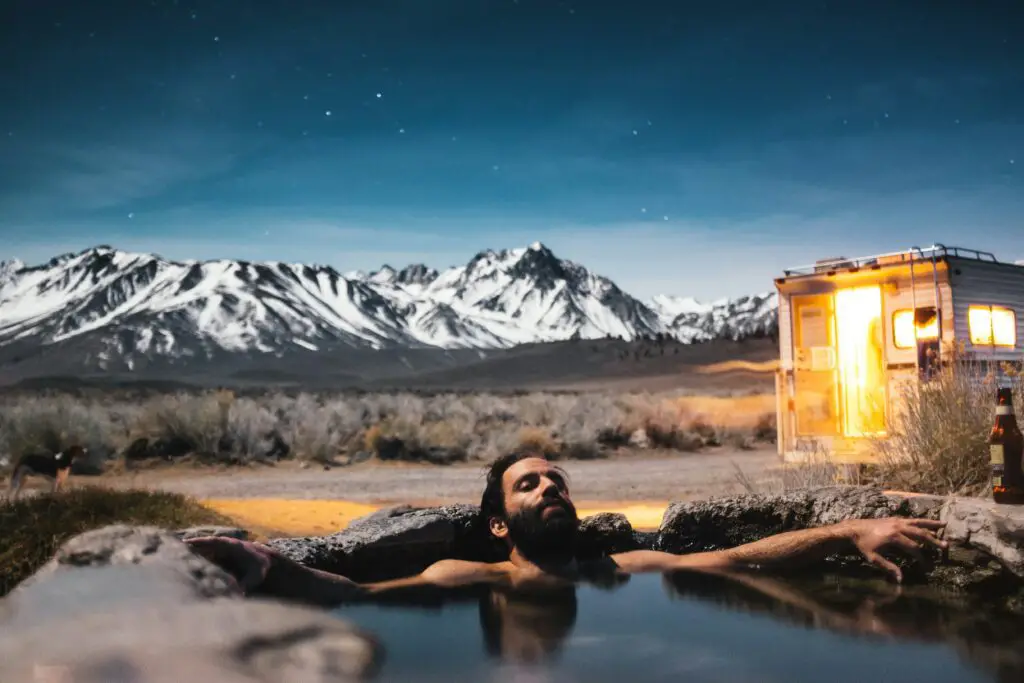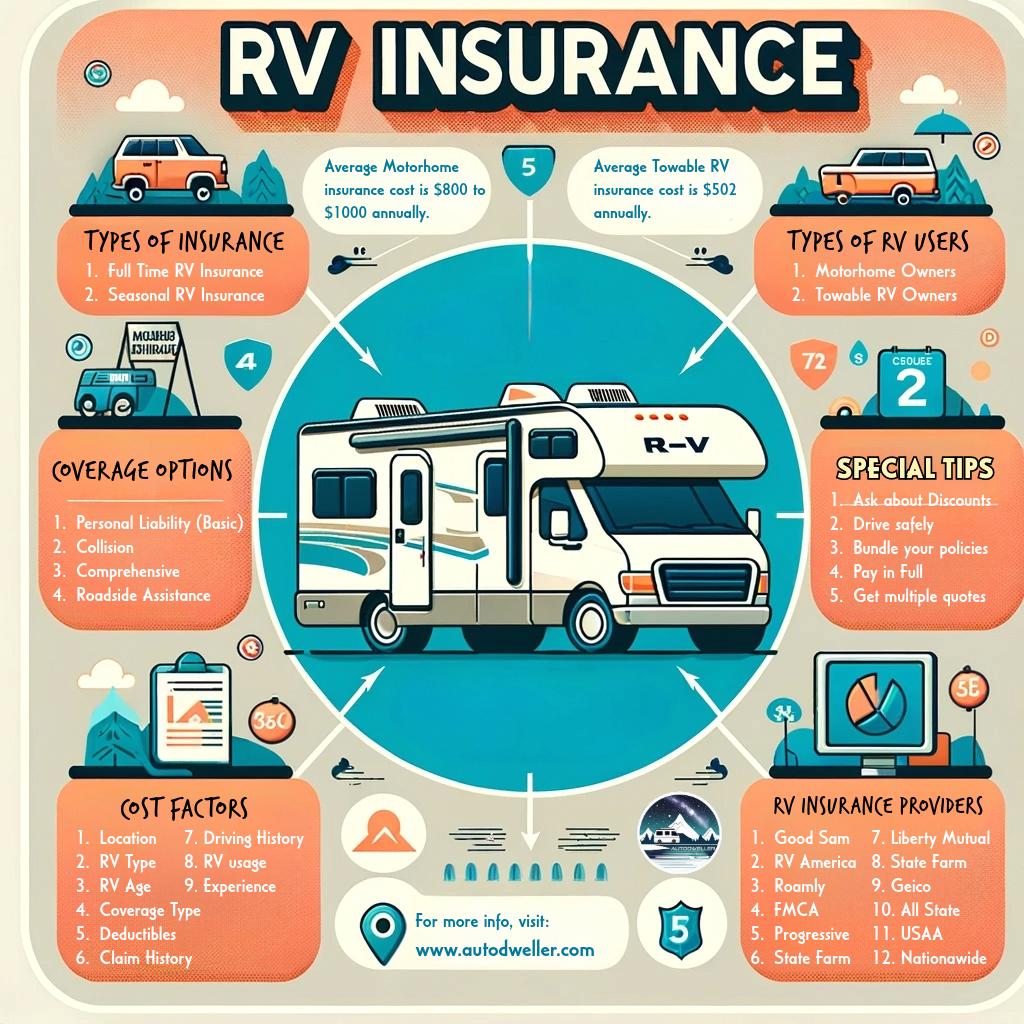Embarking on the RV lifestyle has been a journey of discovery, especially when it comes to understanding RV insurance. My first brush with this necessity came when purchasing our family’s 5th wheel RV seven years ago. We needed insurance that covered not just the basics, but also our unique needs as seasonal campers. That’s when I stumbled upon Good Sam Insurance National General option. Their specialized approach to RV coverage caught my attention.
RV insurance is the unsung hero of every adventure, safeguarding our dreams on wheels. It’s not merely a policy; it’s a promise of freedom, ensuring that every sunset and every campfire is enjoyed with a heart unburdened by worry.

I remember the time our RV faced a minor mishap with water damage in Yellowstone national park. Despite the stress, having comprehensive insurance from a provider like Good Sam Insurance National General option gave us the necessary peace of mind. Their coverage extended beyond standard liabilities, safeguarding our home-on-wheels from unexpected incidents. With hopes that my knowledge and experience will protect you from the pain of potential mishaps, I wish to share with you my complete knowledge about RV insurance, including what it covers, how much it costs and what insurance companies sell RV insurance.
What type of insurance do I need for my RV?
Recreational vehicles, or RVs, can be categorized into two basic types: drivable and towed. If your RV is towed behind your car or truck, it will have different insurance requirements compared to a motorhome that you drive on the road.
Motorhomes, also known as drivable RVs, must have a minimum amount of vehicle liability insurance, equivalent to that required for any other motor vehicle on American public roads. In contrast, towable RVs like trailers or campers do not have such insurance requirements, as the liability protection is typically included in the insurance coverage for the towing vehicle.
This article will serve as a blueprint mainly for Motorhome owners to follow, while also providing towable RV owners with valuable information for future reference. (As a matter of fact, I’ve noticed that many owners of towable RVs also choose to buy RV insurance for added protection!)
One more point to consider is whether you fall into full-time RV user or seasonal RV user classification. (Full-time RVers are people who generally live more than 150 days a year in their RV, and all the rest are classified as seasonal or part-time RV owners.) While this article will be applicable completely for Full-time RV insurance, you can refer my other article specifically for seasonal RV owners.

Share this Image On Your Site
What does RV insurance cover?
There are several types of RV insurance coverages available. Much like personal auto insurance, there are required coverages and optional endorsements that can provide more complete protection.
At its most basic level, RV insurance encompasses personal liability coverage. This offers legal and financial protection in the event that you are responsible for an accident resulting in injury to another driver or damage to their vehicle. Personal liability insurance is applicable specifically when the accident is determined to be your fault.
In 22 states and the District of Columbia, RV owners must also have uninsured/underinsured motorist insurance. This policy protects you in case of an accident with a driver who lacks insurance or sufficient coverage to pay for your injuries or vehicle damages.
In addition to the required policies, many insurance companies also sell endorsements. Here are some of the more common insurance endorsements available for RV owners:
- Collision insurance: If you are involved in an accident for which you are responsible, collision insurance will cover the costs of repairing or replacing your RV.
- Comprehensive insurance: Comprehensive insurance covers the cost of repairing your RV following unexpected non-collision events like theft, vandalism, fire or water damage, hail damage, rodent damage or accidents involving animals.
- Roadside assistance: Roadside assistance covers basic RV repairs, like a flat tire change, fuel delivery, or a new battery.
- Towing & Labor: If your rig breaks down and you need a tow, this will help pay for the towing and could help pay for the labor associated with the breakdown.
- Personal belongings coverage: Certain insurance companies offer a personal belongings endorsement that provides coverage for items in your RV in case of damage or theft.
- Permanent attachments coverages: If you have installed permanent attachments to your RV, such as a porch or awning, this endorsement can offer additional protection for those features.
- Vacation liability insurance: If you use your RV for vacations, this policy provides additional liability protection while you’re parked in a campground or motor home park.
- Gap Insurance: So if your rig is worth $20,000 but you’re still paying $20,000 toward a $40,000 loan on it, gap insurance can cover the extra $20,000 you still owe to your lender if your RV is totaled (as per clovered.com). However, total loss replacement coverage can act similarly if your RV is less than 4 years old, but gap insurance will handle it if your RV is more than 7 years old.
How Much Does RV Insurance Cost?
The process to get RV insurance was an eye-opener for me personally. It wasn’t just about finding a policy; it was about finding the right fit for our lifestyle. Insurance on an RV requires considering factors like frequency of use, travel destinations, and the RV’s features. RV insurance providers, therefore, play a crucial role in guiding this decision. According to Progressive, the average annual RV insurance premium is around $502 for a travel trailer and $848 for a motorhome. For a minimum coverage RV insurance policy, annual rates start at $125 as per Time.com.
Before you buy RV insurance, it’s a good idea to check out different options and get a few quotes. Prices can vary among insurers offering the same coverage. Comparing quotes helps you find the most cost-effective policy for your needs.
What Affects Your RV Insurance Rate?
Insurance companies look at a variety of criteria when calculating your RV insurance premium. Some of the factors that can affect your premium include:
- Location
- Type of RV
- Age of RV
- Types of coverage
- Coverage limits
- Deductibles
- Claim history
- Driving history
- RV usage
- RV driving experience
Where to Get RV Insurance
Many national and regional insurance providers sell RV insurance. Here are some of the biggest and best RV insurance companies that sell coverage for RVs:
- Progressive
- State Farm
- Geico
- Allstate
- The Hartford
- Nationwide
- Liberty Mutual
- Farmers
- USAA
In addition, there are also several insurance companies that specialize in RV insurance. These insurers exclusively sell insurance policies for RVs and motorhomes. Here are several companies to consider:
- RV America Insurance
- Good Sam Insurance
- Roamly
- Family Motor Coach Association (FMCA)
How to Lower Your RV Insurance Premium
RV insurance premiums can be expensive, especially if you own a newer motorhome, or if you live in the RV full-time. However, there are ways to save money on your RV insurance costs. Consider these savings opportunities when you purchase coverage:
- Ask about discounts: Certain RV insurance providers offer discounts that can help secure a lower premium. Discounts are commonly available for maintaining a claims-free record, completing an RV safety course, holding continuous RV insurance, and having a clean claims history.
- Drive safely: You may be eligible for a discount if you have no recent accidents or traffic violations on your record.
- Bundle your policies: Many RV insurance providers will provide a discount on your premium when you buy RV insurance and auto or homeowners insurance together.
- Pay in full: Paying your annual RV insurance premium upfront and in full often qualifies you for an automatic discount with many insurers.
- Get multiple quotes: Comparing prices and obtaining multiple RV insurance quotes can assist you in locating the most affordable rate.
Embracing the open road with an RV is not just about the journey, it’s about cherishing peace of mind.

Does RV insurance include roadside coverage?
Most RV insurance policies don’t come with roadside assistance. If you want this coverage, you have to add it as an endorsement. While getting roadside assistance will raise your premium, it can offer valuable protection, especially if you don’t already have coverage through a service like AAA.
Does RV insurance cover theft of personal items?
Some RV insurance policies cover theft of personal items, but it really depends on the specific policy. Some insurance companies even offer a separate endorsement that gives you more complete protection for stolen personal items. So, it’s a good idea to check with your RV insurance company to see what’s covered and what’s not.
Is RV insurance more expensive than car insurance?
Typically, RV insurance tends to be cheaper than car insurance. But, keep in mind that larger or newer RVs with high value can come with pricey premiums. If you’re curious about RV insurance costs, consider getting personalized quotes from various insurers. Comparing these quotes can help you land the most budget-friendly policy.
Do I really need RV insurance?
If you’ve got an RV, having RV insurance is a must. It’s required by law in almost every state, no matter how often you hit the road. Without it, you could face serious legal and financial trouble if you’re in an accident or get caught driving uninsured. Your personal car insurance usually covers basic liability for trailers, but many folks go for extra RV insurance to be safe from theft, fire, or major damage. When in doubt, check your policy and shop around!
Author
-

Augustus, an intrepid traveler and RV enthusiast, has journeyed across North America, Europe, and Australia, turning his passion for adventure into a life's mission. His love for exploring began in his childhood, with local hikes and camping trips igniting a deep connection with nature. This connection now shines through in his popular travel blog, where he shares not just tips but personal stories, captivating a community of fellow wanderers. His travels are further enriched by his partnership with Zaara, his wife and travel companion, together exploring remote landscapes and diverse cultures. Augustus is also a skilled photographer, capturing the beauty of nature and the essence of his nomadic lifestyle in each shot. His life story is a mosaic of breathtaking experiences, a testament to the beauty of following one’s passions and embracing the unknown, inspiring others to explore the world with the same fervor.
View all posts

